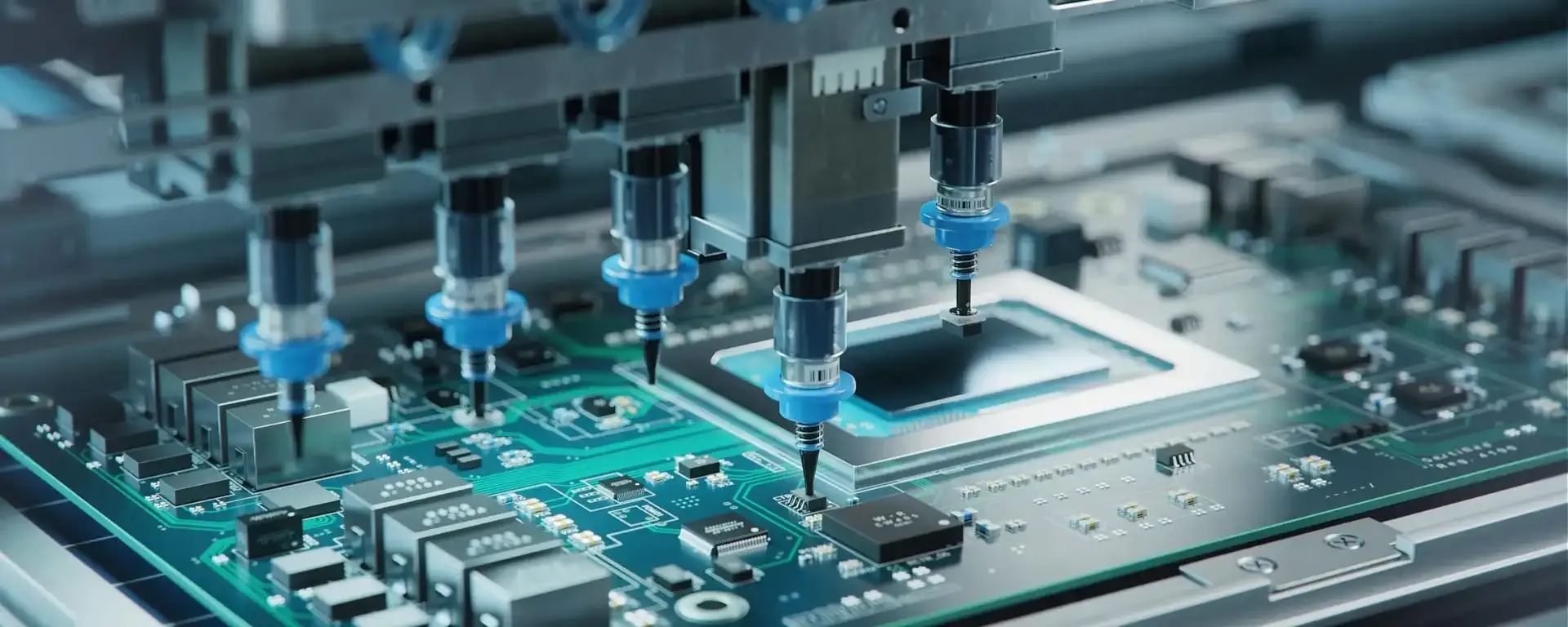Services
SERVICES
SOLUTIONS
TECHNOLOGIES
Industries
Insights
TRENDING TOPICS
INDUSTRY-RELATED TOPICS
OUR EXPERTS

November 27, 2025
Generating realistic production plans and schedules by combining demand forecasts and confirmed orders with real-time capacity, material, and resource availability data to ensure a smooth production flow and minimize waste.
Getting a real-time view of key shop floor activities, including material consumption, production output, scrap levels, and workforce utilization, to have complete control over every aspect of the production line and make informed decisions that streamline production execution and improve overall efficiency.
Tracking raw materials, work-in-progress, and finished goods across multiple warehouses with automated, real-time data updates to detect discrepancies between actual stock levels and demand and streamline inventory management, reducing stockouts and overstocks, as well as inventory carrying costs.
Achieving end-to-end, real-time visibility across the supply chain and getting automated alerts and notifications about potential issues and actual disruptions, like shipment delays, freight damage, or loss, to streamline supply chain planning, management, and execution, while minimizing operational risks.
Automating order management tasks, from multi-channel order capture and scheduling to order processing and fulfillment, to enable on-time delivery, eliminate order processing errors, and maintain high service levels, increasing customer satisfaction and retention.
Achieving consistent high product quality and meeting state, industry-specific, and internal compliance standards through automated scheduling and triggering of quality checks and inspections of materials, components, and finished goods, as well as issue tracking, corrective action management, and reporting.
Structuring and storing detailed product information, including the complete list of raw materials, components, supplier information, and assembly steps, to enable efficient production planning and ensure consistency and accuracy through manufacturing processes.
Generating accurate calculations of what materials and in what quantities are needed to meet production schedules to support production planning, allocate resources efficiently, and minimize the risk of production interruptions.
Automating the entire procure-to-pay process, including purchase order creation, approval workflows, invoice processing, and supplier management and running real-time analytics to enhance financial transparency, measure supplier performance, and enforce budget controls.
Monitoring machine performance and automating maintenance schedules based on real-time condition data, usage patterns, and production plans to minimize unexpected breakdowns, extend asset lifespan, and reduce maintenance costs.
Planning, executing, and monitoring manufacturing projects, from new product development to operations scaling, while enabling effective, cross-department project collaboration to improve project transparency, meet deadlines, and optimize resource allocation.
Consolidating and transforming disparate production data into insightful dashboards to monitor key metrics, detect bottlenecks and their root causes, assess operational efficiency, and make realistic forecasts.
Accurate and timely data on core business processes accumulated in a central database allows all authorized parties to access corporate records, collaborate efficiently, and make informed decisions faster.
The ERP system automates equipment scheduling based on production plans, real-time inventory, and equipment performance data, thereby minimizing idle time and breakdowns and ensuring more efficient use of assets.
ERP generates realistic and accurate production schedules supporting just-in-time and make-to-order manufacturing, enforces production standardization to minimize defects, and provides full visibility into production processes to foster continuous optimization, all of which are fundamental principles of lean manufacturing.
A comprehensive overview of all business processes provided by ERP helps detect operational loopholes and predict and proactively address possible risks, ensuring compliance with regulatory requirements.
With built-in data analytics and visualization tools, ERP enables effective data-driven decision-making, providing real-time insights to improve production efficiency, optimize resource allocation, and quickly identify performance bottlenecks across the manufacturing cycle.
Implementing an ERP system creates a centralized channel for information exchange, eliminating communication bottlenecks, reducing delays, and enhancing overall operational efficiency.



Owing to the wide range of manufacturing ERP solutions available on the market, choosing the best one can be challenging for companies. The following criteria will help manufacturers decide on the best ERP manufacturing system suitable for their production processes and business objectives.
When choosing the best ERP solution, you should decide whether to go for a generic ERP platform, sometimes referred to as a tier-one ERP system, or choose ERP for manufacturing, the so-called tier-two ERP software.
Generic ERP | Manufacturing ERP | |
|---|---|---|
Purpose | Encompasses basic functionality/capabilities required by companies from different industries. | Addresses industry-specific needs of process manufacturing and discrete manufacturing companies. |
Customization | Requires extensive customization to align with manufacturing processes. | Requires less customization since the system offers industry-specific out-of-the-box functionality tailored to manufacturing needs. |
Best for | Companies that need standard software to address their finance and supply chain processes and have their manufacturing-specific workflows covered with standalone solutions. | For companies that need manufacturing software to support production-specific workflows. |
Considerations |
|
|
The next important consideration for manufacturing companies when choosing an ERP platform is the deployment model. Depending on the company’s size, functionality, and unique needs, manufacturers can deploy ERP software in the cloud, on local servers, or in a hybrid environment.
Cloud-based ERP | On-premises ERP | Hybrid ERP | |
|---|---|---|---|
Model | The ERP system is deployed in the cloud, with users accessing the application via the internet. | The ERP software system is deployed in the company’s data center or private cloud and is usually managed by in-house experts. | ERP’s functional modules are distributed across on-premises and cloud environments for flexibility, cost-efficiency, security, or any other reasons. |
Implementation & maintenance | Cloud ERP software (SaaS) is implemented and maintained by the ERP vendor or its certified partners. | On-premises ERP implementation generally takes longer than cloud deployment as the company may need to purchase and set up the required hardware infrastructure. An in-house IT team or a third-party vendor manages upgrades and maintenance. | ERP solution implementation, upgrades, and maintenance are handled by an in-house team or a third-party vendor. |
Scalability | Cloud ERP software is highly scalable, with platform scaling performed through license purchase/upgrade. | Scalability is limited with in-house hardware resources and therefore can be time- and resource-consuming. | Adding new capabilities to cloud software is faster than upscaling and downscaling on-premises capabilities due to great reliance on hardware resources. |
Security | For SaaS ERP solutions, infrastructure and data security is the responsibility of an ERP provider. | Depends on the expertise of the in-house IT team. | Under the responsibility of both the ERP vendor and in-house IT team. |
Costs | Low upfront investment due to subscription-based payment model (SaaS) but costs for licensing and infrastructure maintenance can grow over time. | High capital investment for the purchase of equipment, licenses, and ongoing maintenance of the IT infrastructure. | High upfront costs as it is necessary to integrate and support two environments at once: cloud and on-premises. |
When looking for an ERP system for manufacturing, it is necessary to consider the availability of mobile support, including features such as real-time access to inventory and warehouse data, orders, shop floor information, and production schedules, as well as notifications, triggers, and alerts. Consider ERP systems that provide mobile access either through responsive web interfaces or through dedicated mobile applications, enabling employees to input, access, and report critical real-time data anywhere from any device to manage key business processes.
When choosing an ERP system for manufacturing, it is important to consider not only the cost of software licenses and implementation, but also the total cost of ownership of ERP software early on to avoid unexpected expenses. ERP TCO for a manufacturing company depends on multiple factors that directly affect the financial efficiency of implementation and long-term return on investment. These factors include:
An accurate TCO assessment allows companies to compare different ERP solutions and choose the system that provides the optimal balance between costs and business results.
Implementing an ERP software solution is a complex task that can be fraught with multiple risks to business processes and workflows. Understanding the challenges that can arise helps companies develop effective mitigation strategies and be better prepared for their ERP initiative.
Challenge | Solution | |
|---|---|---|
Data migration issues |
Manufacturing companies accumulate large volumes of financial, production, and supplier data across
corporate systems. Migrating this data to the ERP solution requires robust data extraction,
transformation, and loading processes, which carry potential risks, like data loss, corruption, or
duplication.
| To address data migration issues, companies need to carefully plan data transfer activities. A data migration plan should incorporate such activities as data auditing and cleansing to eliminate redundant datasets, data mapping to ensure proper data alignment between source and target system, as well as post-migration data validation to ensure data accuracy and integrity. |
EPP deployment risks |
When implementing an ERP system, there is a risk of system downtime, which can temporarily block access to
critical functions and lead to delays in operational activities.
| To minimize ERP deployment risks, companies need to develop a detailed deployment strategy based on their business needs, resources, and processes. For example, in case of large and complex ERP projects, it’s recommended to run the old and new ERP systems in parallel, gradually rolling out one ERP module after another to reduce the risks of operational setbacks. |
Data security |
An ERP system consolidates all critical business data on a single platform, which makes it extremely
vulnerable to misuse, whether due to weak passwords, phishing attacks, or improper access control.
| For comprehensive data security in your ERP system, companies need to implement multiple security measures, including stringent role-based access controls (RBAC), multi-factor authentication, data encryption, network firewalls, regular security audits, ongoing data monitoring and log auditing, employee security training, and an incident response plan. |
Employee onboarding |
Adopting a new ERP solution can be challenging for employees because of the different levels of digital
literacy.
| When selecting an ERP software provider, ensure that they provide comprehensive usage guides and training support. This helps companies onboard their employees as soon as possible and ensures that all users can confidently utilize the ERP system in their everyday activities. |
Itransition provides a comprehensive suite of ERP services to help manufacturers manage every stage of production and scale their business operations.

Our ERP consultants conduct a detailed analysis of your IT infrastructure and business requirements and objectives and identify ERP requirements to select the most appropriate system that helps you optimize and streamline business operations.
We implement platform-based ERP and build custom ERP solutions by following a step-by-step process that includes business needs analysis, project planning, solution development, customization, and after-launch support that enables manufacturing companies to take full advantage of ERP implementation.
With dozens of ERP software options available on the market, you can choose the right ERP system by taking the following steps:
If you need help mapping your ERP requirements to software capabilities and choosing the best fit, you can turn to a third-party ERP consultant.
While each ERP implementation process is unique, there is a standard sequence of steps that organizations usually follow:
1. Business analysis
2. Design
3. Project planning
4. Development/Customization
5. Launch
6. After-launch support
Implementing an enterprise resource planning (ERP) solution for a modern manufacturing company with complex business processes can take between 6-12 months for a platform-based solution and 12+ months for a comprehensive custom-built ERP system.
Companies integrate ERP software with third-party systems to extend its functionality, increase collaboration between different teams, and improve cross-functional efficiency. Most often, companies integrate ERP with:

Insights
Find out how to select the right ERP implementation strategy and set a suitable roadmap for successful software adoption.

Service
ERP consulting and development services from certified ERP experts. Platform-based and custom ERP solutions for business data integration and workflow automation.

Insights
Learn the top 10 ERP implementation best practices to enhance your project planning, maximize the return on investments, and minimize the risk of failure.

Service
Comprehensive ERP consulting services from experienced ERP consultants to help companies match their needs to ERP requirements and select an optimal ERP vendor.

Service
Itransition delivers scalable software to help manufacturers automate business processes, optimize manufacturing operations, and improve decision-making.

Insights
Learn when to migrate to a new ERP system and how to migrate data securely with minimal risks, as well as discover which ERP platforms to consider.

Insights
Explore core features, and integrations of aerospace and aviation ERP systems for aircraft manufacturers, suppliers, and MRO companies.

Case study
Read the story behind Itransition’s 5-year collaboration with a leading UK furniture manufacturer on web, mobile and VR solutions.
Platforms
Industries